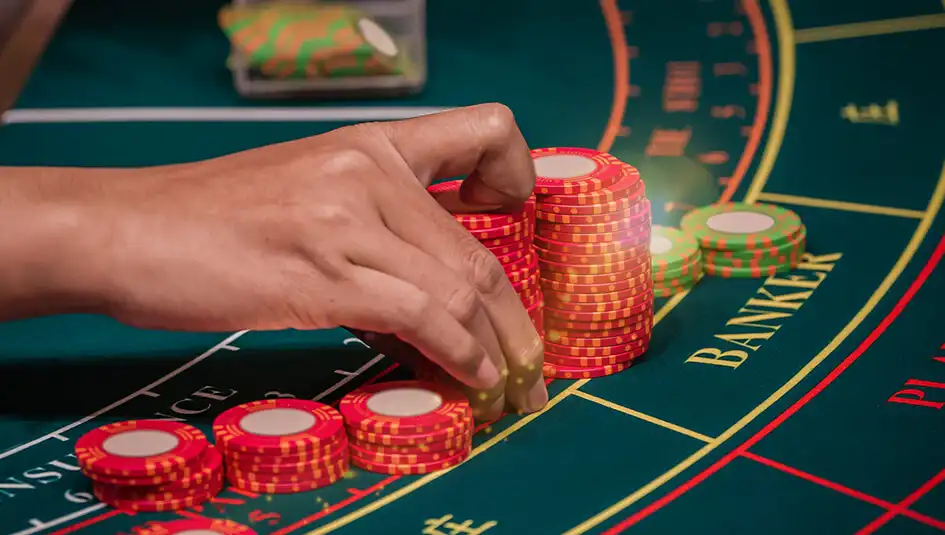As with so many gambling games, Baccarat is primarily a game of luck and nothing you can do will completely overcome this and guarantee that you will always win. However, if you fully understand the rules, the odds and the probabilities of how the game will unfold, then you can improve your chances.
Don’t Be Scared by Baccarat
There is a lot of mystique surrounding Baccarat but the first thing to make sure of is that you are not scared of the game. It is a fun and relatively simple card game that can be enjoyed by all. For years it was considered a game only to be enjoyed by the gambling elite, but at online casinos everyone can take a seat at a table and no one will be looked down upon.
Make Sure You Understand the Baccarat Rules
In order to begin putting together a winning Baccarat strategy it is absolutely essential that you completely understand the rules of the game. Luckily the rules of Baccarat are fairly straight forward and can be summarised as follows:
- There are three bets you can place, on the Player’s hand, the Banker’s Hand or a Tie. If you place a bet that matches the outcome of a hand then you win.
- To start a round the Player and the Banker are each dealt two cards. On occasion one or both of them will then receive a third card.
- The Player and the Banker cannot decide if they want a third card. The decision is made according to the strict rules of the game. If you are playing Baccarat online then the software will automatically deal you a third card when it is necessary.
- Face cards and tens count as zero, aces are worth one and all the other cards are worth their face values.
- When you add up the values of the cards in a Baccarat hand you only pay attention to the final digit. For example, 14 counts as 4 and 19 counts as 9.
- The hand that comes closest to a total of 9 wins the round.
Betting on the Banker vs the Player
There are advantages and disadvantages to betting on both the Banker and the Player in Baccarat. The advantage of betting on the Banker is that according to the game’s statistics the Banker hand will win slightly more than the Player’s hand does. This may be puzzling as the cards are dealt randomly, but it has to do with the rules determining if a third card is dealt.
The rules that deal with the third card are very complicated but there is an explanation for them in the casino software. The rule relating to the Banker is not the same as the rule relating to Player. The Banker’s rule involves factoring the Banker’s initial cards, whether the Player has received a third card and if so, what that third card is. It is because of all of this that the Banker has a slight statistical advantage and this means that in the long run, the Banker is likely to win more hands than the Player wins.
However, there are advantages to betting on the Player. The main one being that if you win you get to keep all of our winnings. If you bet £20 on the Player and win then you will receive your bet back and an extra £20. However, in most games of Baccarat, if you bet on the Banker and you win you will have to pay a five percent commission on your winnings to the house. That means that you would get back just £19. Therefore, a winning bet on the Player results in more winnings than a winning bet on the Banker.
The decision is ultimately up to you. You can choose to bet on the Banker and win a little less, a little more often or you can bet on the Player and win less often but not have to pay any commission. The different advantages and disadvantages pretty much cancel each other out but those who follow statistics will probably prefer to bet on the Banker.
Betting on a Tie
As with the Player and Banker bets, there are also distinct advantages and disadvantages to betting on a Tie. The major advantage is the much larger payout. Most Baccarat games payout 8 to 1 for a tie. This means that if you bet £20 on a Tie and win then you will receive your £20 back and an extra £160.
The major drawback to the Tie bet is that according to the statistics less than 10 percent of hands in Baccarat will result in a tie. That means that if you are betting on a Tie for one hundred hands, according to the statistics you will lose ninety of them and win ten. Sticking with the £20 bets this means that you would lose £1,800 and win £1,600, leaving you down £200 for the session.
Of course, the reality rarely works out as smoothly as the statistics would suggest. You could play the same hundred hands and win 90 Tie bets. Many players place the Tie bet and get lucky. However, in the long run, the statistics will play out and the Tie hand will lose around 90 percent of the time. As a result, it is not a good idea to only place the Tie bet, but if you manage your bankroll carefully there is nothing wrong with the occasional punt on it.

 This Week’s Big Winners at mr.play Casino
This Week’s Big Winners at mr.play Casino Three Exciting Slots Arrive at mr.play Casino
Three Exciting Slots Arrive at mr.play Casino